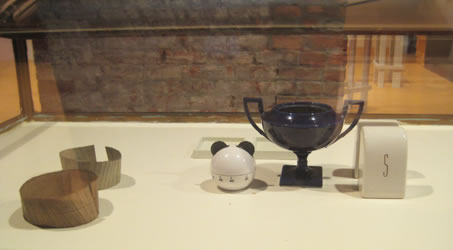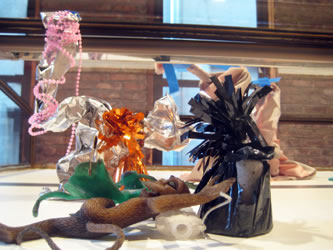Case Study
The Glass Menagerie (February 21 - April 4, 2010)
"Yes I have tricks in my pocket, I have things up my sleeve. But I am the opposite of a stage magician. He gives you illusion that has the appearance of truth. I give you truth in the pleasant disguise of illusion."
--Tom Wingfield, The Glass Menagerie (by Tennessee Williams, 1941)
In the early 1940s, Tennesse Williams wrote what was to become his first major work. Titled The Glass Menagerie, the play takes place in 1937 and recounts the story of a family in the midst of a personal depression. The characters include an absent father (represented by a painted portrait), a struggling mother tethered to her glorious debutant past, and two grown children: a mentally ill daughter who spends her days playing with her glass animals, and a factory-working son who finds his escape in movies, poetry, and on the fire escape outside the family's apartment window. The son, who serves as the narrator, is widely thought to be Tennessee Williams himself.
This installation took its inspiration from the play, though we couldn't help but make the story our own. The figurative arrangements -- consisting of ceramic and rubber animals, a neo-classical sugar urn, salt & pepper shakers, silk flowers, jewelry, two cardboard maquettes of Richar Serra sculptures, decorative trees, tied and bundled fabric, an egg timer , crumpled aluminum foil -- were meant to evoke a series of fantastic worlds, collected together under a glass top (making it a "glass menagerie"). The texts, which we wrote without borrowing anything from the play, mix events and characters from Williams' story with elements from our lives.
This case, this gallery, a luminescent beast, our fire escape.
* * *
Individual texts in the case:
Poor Laura. A husband's broken leg, her shattered skull. They've left for the northern cottage that she decorates with vintage curtains, trunks, quilts, and cheap china.
Jane sleeps with her past -- polished chrome on the hubcap, silver candles in the drawer. Oil black as tar pulsing through the pipes under the freshly paved driveway.
From the fire escape I can see them. Their mouths in a blind slur, backs face to face. Hers is hunched, tired, tight. His a blinking sign. Every night the disaster skips like a needle on the vinyl until her door slam shakes the window glass.
The fish tank holds her mind in its wet, gelatinous mittens. She has placed a plant here, smoothed the gravel there. To others it is dry and empty.
Tom writes poetry no one will read. He arranges the words like shells on a table. Parses them. Sizes them. Removes those with imperfections until he has found his own shape.
Father. His portrait rests on the mantle, opaque. An offering not to us, surely. Someday mother will take it down.
At what point do we become the fools, performers in a play that no one is watching. Wait: I feel eyes upon me. Is this my salvation?



